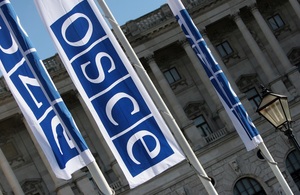Presidential elections and referendum in the Kyrgyz Republic: UK statement
World news story
Delivered by Nicola Murray, Deputy Head of Delegation, at the OSCE Permanent Council on 21 January 2021.

Madam Chairperson,
I would like to thank Ambassador Dzhusupov for raising the issue of the Presidential elections held in his country on 10 January, and thank ODIHR for its thorough account of the process, again demonstrating the institution’s importance to promoting democracy and the rule of law.
The United Kingdom’s support for the Kyrgyz Republic’s ambition to strengthen its democratic processes and rule of law is central to our bilateral collaboration. The Kyrgyz Republic stands out in Central Asia for its approach to democratic elections, its active civil society, and freedom of the media.
We congratulate President Japarov on his election and look forward to strengthening the relationship between the UK and Kyrgyzstan during his Presidency. We commend the electoral authorities in Kyrgyzstan for presiding over an orderly and well-administered poll despite the short time frames and the additional challenges posed by the COVID-19 pandemic.
However, we are concerned by the OSCE observer mission’s report that highlighted a range of violations that threaten the democratic process in Kyrgyzstan, including the use of administrative resources during campaigning, unbalanced access to state media, and constraints on private media.
We call on the Government of Kyrgyzstan again, to address the longstanding recommendations made by ODIHR. These include completing voter lists, so more Kyrgyz citizens are able to vote, and ending the misuse of administrative resources in electoral campaigning. The Kyrgyz Government must also do more to protect journalists, so that they may provide investigative, analytical and critical reporting to the benefit of voters and democracy.
The United Kingdom stands ready to do what it can to support the strengthening of democracy and the rule of law in Kyrgyzstan, including through supporting the recommendations of this ODIHR report.
Thank you.
Published 21 January 2021
